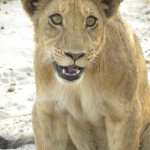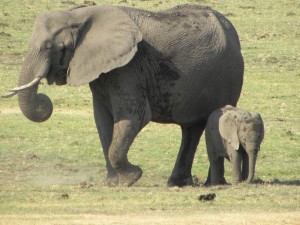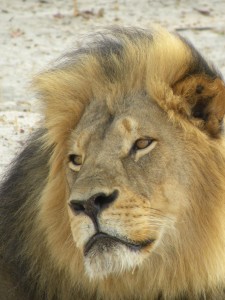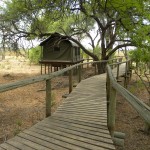
Wanna Play?
I recently returned from a safari trip to Botswana, Zambia, and Zimbabwe. My group stayed in remote bush camps with no fences; the animals wandered among our tent cabins at will. We heard lions and hyenas all night long; one morning ten of them surrounded the tent next to us–imagine seeing a circle of lions waiting outside your flimsy screen window! It was an interesting experience being a potential link in the food chain instead of at the top of it. We don’t often need to think that way in North America.
As a mystery writer, I was busy collecting tips of how to survive (or not) in the bush. Yes, the animals may eat you (lions, leopards, hyenas, crocodiles) or simply bite you in half (hippos) or stomp you to death (elephants, buffaloes, giraffes, etc.) But the stories that impressed (and depressed) me the most were about the poachers.

Elephant with a tiny baby
While elephants are still slaughtered for their ivory and whole elephant clans are killed at once, rhinos are the most at risk. All because some Asians believe that rhino horn is an aphrodisiac (the biggest markets are China and Vietnam) and Yemen prizes rhino horn handles on their daggers. So rhinos are routinely murdered for their horns, and as long as the market is there, there doesn’t seem to be any way to stop the slaughter.
Authorities tried putting radio collars on the rhinos; the codes were mysteriously sold to the poachers. Authorities tried cutting off the rhino horns (the horns grow back; they are the same material as our fingernails), but the poachers killed the hornless rhinos because they didn’t want to waste time tracking them. There probably won’t be any rhinos left in the wild within a few years; we didn’t see one. Park rangers have the right to kill poachers on sight, but since the poachers usually have automatic weapons (and sometimes helicopters), it’s often the rangers who end up dead.

On one side of the tracks, Big Daddy is safe. The other, he’s dead.
The Chinese are building infrastructure projects all over Africa, so the next generations of Africans may look to the East for leadership rather than to our hemisphere. But Americans are still invested in Africa, too. Hwange Park in Zimbabwe is bordered by a railroad line, and on the other side of the tracks is a big sign announcing the Houston Safari Club. Americans pay to pump water for animals there, saving them from dying of thirst. And they also buy expensive licenses to shoot them.
The bush is Africa in all its beauty and brutality. And the human animals are a big part of both.

Did you learn anything about what the punishment or charges are against people who are caught poaching, Pam?
In some countries, poachers can be shot on sight, and if caught later, can be imprisoned for many years. In others, the fines are only monetary and because the poachers make so much money, they consider the fines a cost of doing business. But the biggest problem is that poachers are rarely caught.